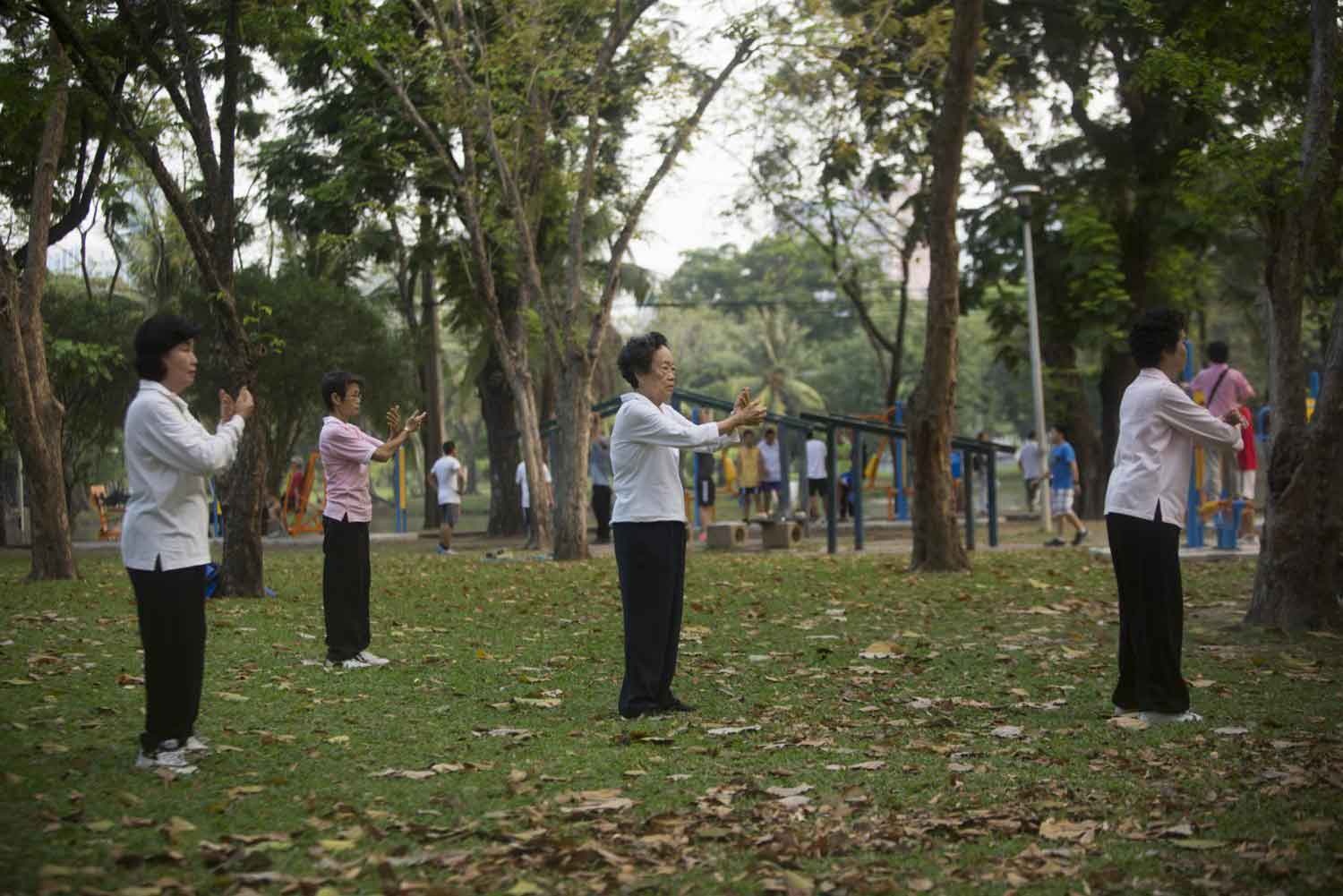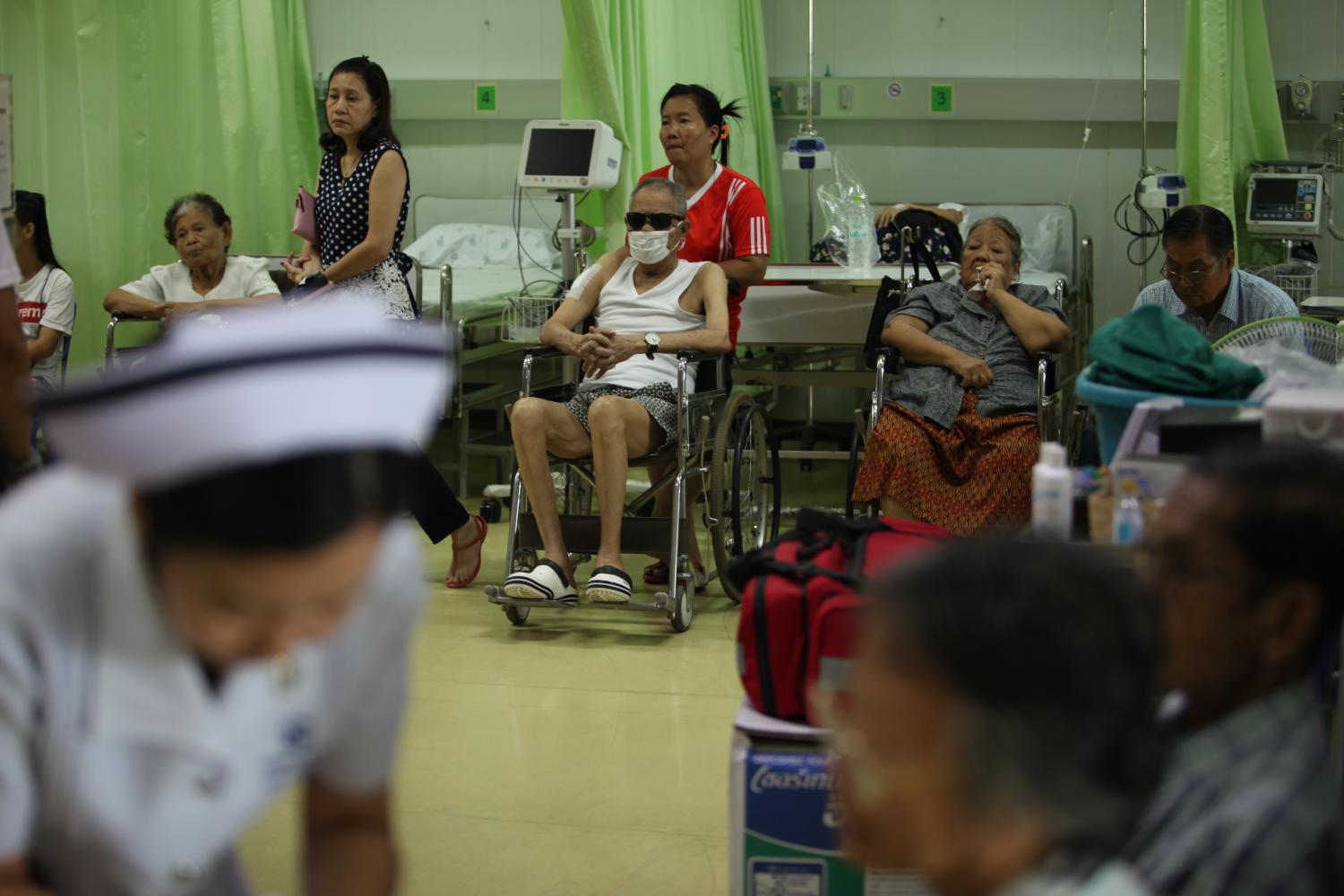
Thailand is expected to become an "aged" society this year or next, with people aged 60 and over set to account for 20% of the population.
The country has been classified an "ageing" society since 2005, meaning 10% of the population is 60 or older.
This trajectory has Thailand becoming a "super-aged" society in 2031 or 2032, where those aged 60 and over make up 28% of the population.
According to Kasikorn Research Center (K-Research), roughly 95%-96% of the Thai elderly population has low to moderate income. These demographic changes present great challenges for policymakers, particularly amid the ongoing pandemic, which has caused great hardship not only to the country's economy, but also to people's way of life.
These shifts also offer business opportunities for products and services that target the elderly market.

- Economic impact -
A source in the Finance Ministry who requested anonymity said the ministry is concerned the ageing demographics could impact economic expansion.
Thailand's labour force is expected to shrink to 36 million in 2037 from an estimated 40 million in 2027. Last year Thailand had around 42 million people working in a population of 69 million.
2019 was the first year the number of elderly people in Thailand surpassed the figures for newborn children. The average lifespan for Thais last tallied 76 years -- 73 for males and 81 for females.
The Finance Ministry forecasts the elderly accounting for 20% of the population in 2023 before rising to 28% in 2034.
The government has introduced multiple pension fund systems to cater to retirees. One system has the government and workers making joint contributions to a fund that pays pensions upon retirement, such as the Social Security Fund or Government Pension Fund.
However, a great number of workers in the informal sector are not members of pension funds. Of an estimated 20 million informal workers, only 5.82 million are registered in pension fund systems.
POLICIES NEED REJIG
Aat Pisanwanich, director of the Center for International Trade Studies at the University of the Thai Chamber of Commerce, said Thailand's economic structure and policies have not been adjusted to cope with growing threats from an ageing population, both in the government and private sectors.
Thailand's social security system has not been upgraded to provide adequate welfare, as seen in the EU and US to reduce the government's financial burden, said Mr Aat.
"The government and companies should announce a policy to extend the retirement age to 65, up from 60, to allow healthy elderly to continue work, perhaps at a lower salary," he said. "The elderly have more work experience than new university graduates."
Given the current sluggish economic conditions, the government needs clearer policies to support industries, such as awarding promotional incentives for firms that offer adequate pensions, said Mr Aat.
Visit Limlurcha, vice-chairman of the Thai Chamber of Commerce, said the growing elderly population offers myriad business opportunities, both for older people who remain healthy and those with health conditions. For example, there could be food, products and services for the elderly, he said, as well as home care services and lodging.
Thailand faces the risk of a labour shortage and it needs to speed up applying automated systems and use of robots to help in the production sector, said Mr Visit.

- Silver age, golden opportunity -
Krod Rojanastien, president of the Thai Spa Association, said the country is becoming an aged society at a rapid rate, but there is still potential for wellness tourism after the outbreaks increased health awareness.
Senior travellers, particularly those who already have fulfilling lives, are willing to invest more in health and wellness services, such as health checkups that can indicate how well they take care of themselves, he said.
Mr Krod, who is also a consultant at Chiva-Som International Health Resort, said the silver segment is one of its top markets locally, particularly active guests eager to engage in holistic lifestyles.
Senior tourists in Thailand average three-day stays at Chiva-Som, though some make annual visits of 7-10 days, he said.
The resort offers health and wellness packages for every age group and health condition including the elderly, which sometimes focus on weight loss programmes focused on exercise and diet.
Chiva-Som adjusted its facilities to a "universal design" to assist elderly guests, building ramps for wheelchairs and handrails, said Mr Krod. The resort will keep adding such features to cater to an elderly population, he said.

The resort aims to create a mixed community that allows senior guests to connect with younger generations and exchange knowledge and perspectives at the facility, which can help fight off loneliness, said Mr Krod.
"The government has to roll out effective and accessible welfare programmes for senior citizens in the near future, ensuring their quality of life instead of having them end up as bedridden patients," he said.
Mr Krod said the private sector can encourage people to adopt healthier lifestyles as the company discussed with the Public Health Ministry a national health-related agenda.
- New target -
The elderly is becoming a major target market in Thailand, with demand for healthcare services and products that match post-retirement lifestyles on the rise, said health and industry analysts.
With people aged 60 and older expected to make up more than 20% of the Thai population soon, the government faces a challenge in driving the economy as the labour force decreases, which will subsequently lead to lower tax collection, said Boon Vanasin, chairman of SET-listed Thonburi Healthcare Group (THG).
Entrepreneurs, especially healthcare service providers, have already begun to adjust their businesses to better serve elderly people, a move the government needs to follow to ensure a good quality of life for senior citizens, he said.
"The government must create measures to deal with an aged society, making the elderly feel secure, but not overdependent on state welfare," said Dr Boon.
Many private healthcare facilities have been set up to keep elderly people physically and mentally healthy.
THG established Jin Wellness accommodation, a mix of facilities including low-rise buildings with 500 units and a 50-bed hospital, as it sees a new business opportunity in the silver market, he said.
The 3.7-billion-baht facility is located on 142 rai of land in the Rangsit area of Pathum Thani, north of Bangkok.
The company said earlier it expected to sell all units this year, believing sales will get a boost from an economic recovery following the reopening of the country.
The resident mix at Jin Wellness includes Thais, Americans and Chinese.
"In addition to healthcare, health food and food supplements, some fashion items for the elderly are also becoming popular," said Supant Mongkolsuthree, chairman of the Federation of Thai Industries.
He said this trend is not only local, but also happening abroad as the number of elderly people is increasing.
Many industries are developing new products and services as the elderly market grows, said Mr Supant.

- Telehealth focus -
Telehealth is regarded as an important feature that will support basic medical treatment and consultation for the elderly at home. The trend is expected to flourish in the years to come.
According to K-Research, telehealth is expected to register compound average growth of 7.3% over the next three years. The country's telehealth market grew 2.4% year-on-year to around 2.3 billion baht in 2021.
Natwut Amornvivat, co-president of True Corporation, a telecom operator, said telehealth is one way to support an ageing population in Thailand and the service gathered steam during the pandemic.
He said smartphone users can seek consultation from doctors and use the Internet of Medical Things for health checks to provide data to doctors, including blood pressure and blood sugar levels. These devices can be located in community areas, said Mr Natwut.
"Hybrid health tech services will gain momentum over the next five years," he said.
True provides such services in more than 30 public locations, including department stores, under the True Health platform.
Good Doctor Technology Thailand (GDTT), a subsidiary of regional health-tech company Good Doctor Technology, indicated health technologies can meet the needs of the elderly, such as monitoring patient conditions for non-communicable diseases.
"Factors contributing to the management of disease such as food, nutritional intake and activity levels can also benefit from digital-first solutions, which allow for more continuous data tracking that helps both doctors and patients," said Dr Sudhichai Chokekijchai, head of medical at GDTT.
Easily integrated health gadgets that are straightforward in function and feature can be used to support the elderly population with chronic health problems in better managing their conditions, he said.
Another key area in which health technology solutions can benefit elderly patients is increased access to doctors through telemedicine services for virtual consultation, laboratory work and faster access to medication, all from the comforts of their home, said Dr Sudhichai.
He said Thais of all age groups are comfortable with messaging apps and this highlights the high potential for telemedicine with an ageing population.







